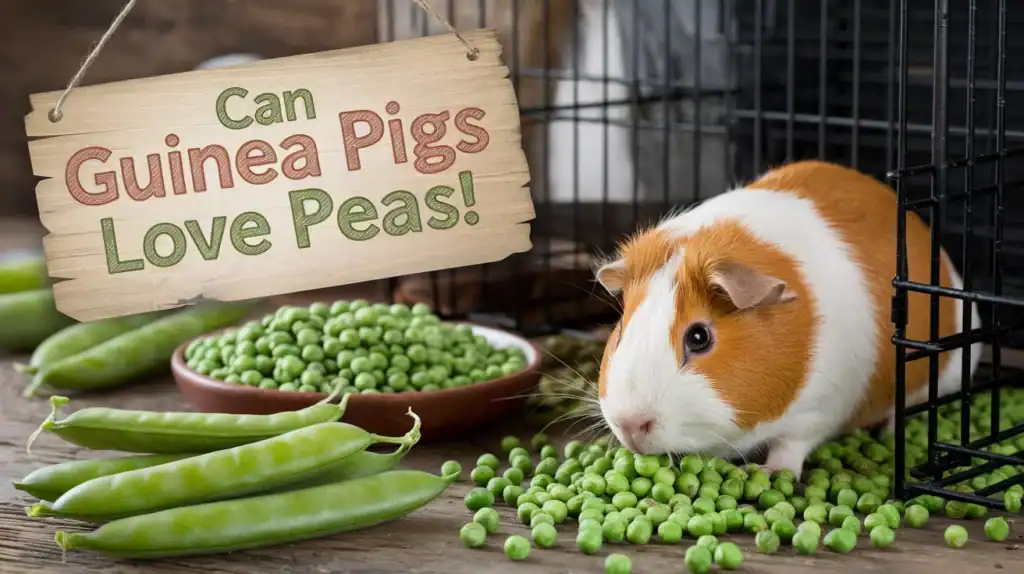Guinea pigs are adorable little pets that require a well-balanced diet to stay healthy. As a guinea pig owner, you may wonder, can guinea pigs eat peas? The short answer is yes, but with some precautions. While peas offer essential nutrients, they can also pose some risks if not fed properly. This guide will provide everything you need to know about feeding peas to guinea pigs, including nutritional value, health benefits, risks, feeding methods, and alternatives.
Can Guinea Pigs Eat Peas? ✅
Yes, guinea pigs can eat peas in moderation. Fresh peas contain vitamin C, fiber, and antioxidants, which are beneficial for their health. However, peas also have sugar and phosphorus, which means they should only be an occasional treat.
Let’s dive deeper into the nutritional value, benefits, risks, and feeding guidelines.
Nutritional Value of Peas 🥦
Peas are packed with essential nutrients that can benefit guinea pigs. Below is a nutritional breakdown of peas per 100g:
| Nutrient | Amount | Benefit for Guinea Pigs |
| Vitamin C | 40 mg | Boosts immune system & prevents scurvy |
| Fiber | 5.1 g | Aids digestion & prevents constipation |
| Protein | 5 g | Supports muscle and tissue repair |
| Sugar | 5.7 g | Provides energy but should be limited |
| Calcium | 25 mg | Supports bone health but excessive calcium may cause bladder stones |
| Phosphorus | 108 mg | Needed for growth but should be balanced with calcium |
| Water | 79 g | Keeps guinea pigs hydrated |
Health Benefits of Feeding Peas to Guinea Pigs 🌱
Feeding peas in small amounts can provide several health benefits for guinea pigs:
1. Rich in Vitamin C 🍊
Guinea pigs cannot produce their own vitamin C, making it essential to include vitamin C-rich foods like peas in their diet. This helps in preventing scurvy, boosting immunity, and improving skin health.
2. Good Source of Fiber 💪
Fiber is crucial for maintaining a healthy digestive system. Peas contain a decent amount of fiber, which helps prevent bloating, constipation, and diarrhea.
3. Antioxidant Properties 🛡️
Peas contain antioxidants like flavonoids and carotenoids, which help fight free radicals, reducing the risk of diseases.
4. Provides Hydration 💧
Since peas have high water content (79%), they contribute to hydration, especially in warmer seasons.
5. Supports Muscle and Tissue Repair 🏋️
The protein in peas helps with muscle growth, repair, and overall body development.
Potential Risks of Feeding Peas to Guinea Pigs ⚠️
Although peas have many benefits, they also come with certain risks. Here are some potential concerns:
1. High Sugar Content 🍬
Peas contain 5.7g of sugar per 100g, which can contribute to weight gain, diabetes, and digestive issues if overfed.
2. Gas and Bloating 💨
Peas belong to the legume family, which can sometimes cause bloating and gas, leading to discomfort.
3. Choking Hazard 😱
Whole peas can be difficult to chew and pose a choking risk, especially for young or small guinea pigs.
4. High Phosphorus Levels ⚖️
An imbalance of phosphorus and calcium can lead to urinary problems. Too much phosphorus may contribute to the formation of bladder stones.
5. Not Suitable for Daily Feeding ❌
Peas should only be given once or twice a week to avoid health complications.
Can Guinea Pigs Eat Different Types of Peas? 🏷️
Different types of peas vary in their suitability for guinea pigs. Here’s what you need to know:
| Type of Pea | Can Guinea Pigs Eat It? | Notes |
| Fresh green peas | ✅ Yes, in moderation | Best option, rich in vitamin C |
| Snow peas | ✅ Yes, but occasionally | Contains more sugar, so limit intake |
| Sugar snap peas | ⚠️ Yes, but rarely | High sugar content; avoid frequent feeding |
| Frozen peas | ❌ No | Can cause digestive problems |
| Canned peas | ❌ No | Contains preservatives & sodium |
How to Safely Feed Peas to Guinea Pigs 🥄
To avoid health risks, follow these safe feeding tips:
✔️ Always wash peas thoroughly to remove pesticides.
✔️ Serve peas raw – never cooked, as cooking removes essential nutrients.
✔️ Feed in small portions – about 1-2 peas per serving.
✔️ Remove any uneaten peas from the cage after a few hours to prevent spoilage.
✔️ Observe for any digestive issues after feeding.
Signs of Overfeeding or Adverse Reactions 🚨
If your guinea pig experiences any of the following after eating peas, stop feeding them immediately and consult a vet:
❌ Diarrhea – Loose stools indicate digestive upset.
❌ Bloating or Gas – A sign that their stomach is struggling with digestion.
❌ Lethargy – Lack of energy may indicate discomfort.
❌ Loss of Appetite – If your guinea pig refuses to eat, it could be due to stomach discomfort.
Alternative Vegetables for Guinea Pigs 🥗
If you’re looking for other safe vegetables, here are some great options:
✔️ Bell peppers – Excellent source of vitamin C.
✔️ Carrots – Rich in beta-carotene but should be limited.
✔️ Lettuce (Romaine) – Hydrating and low in sugar.
✔️ Cucumber – High in water, keeps guinea pigs hydrated.
✔️ Zucchini – A great low-calorie treat.
Conclusion 🏁
So, can guinea pigs eat peas? Yes, but only in moderation. Peas provide vitamin C, fiber, and hydration, making them a nutritious treat. However, due to their sugar and phosphorus content, they should be fed sparingly. Always serve them fresh and raw, and monitor your guinea pig for any digestive issues.
By following these safe feeding guidelines, you can ensure your guinea pig enjoys peas without any health risks. Would you like more guinea pig diet tips? Let us know in the comments! 🐹💕

